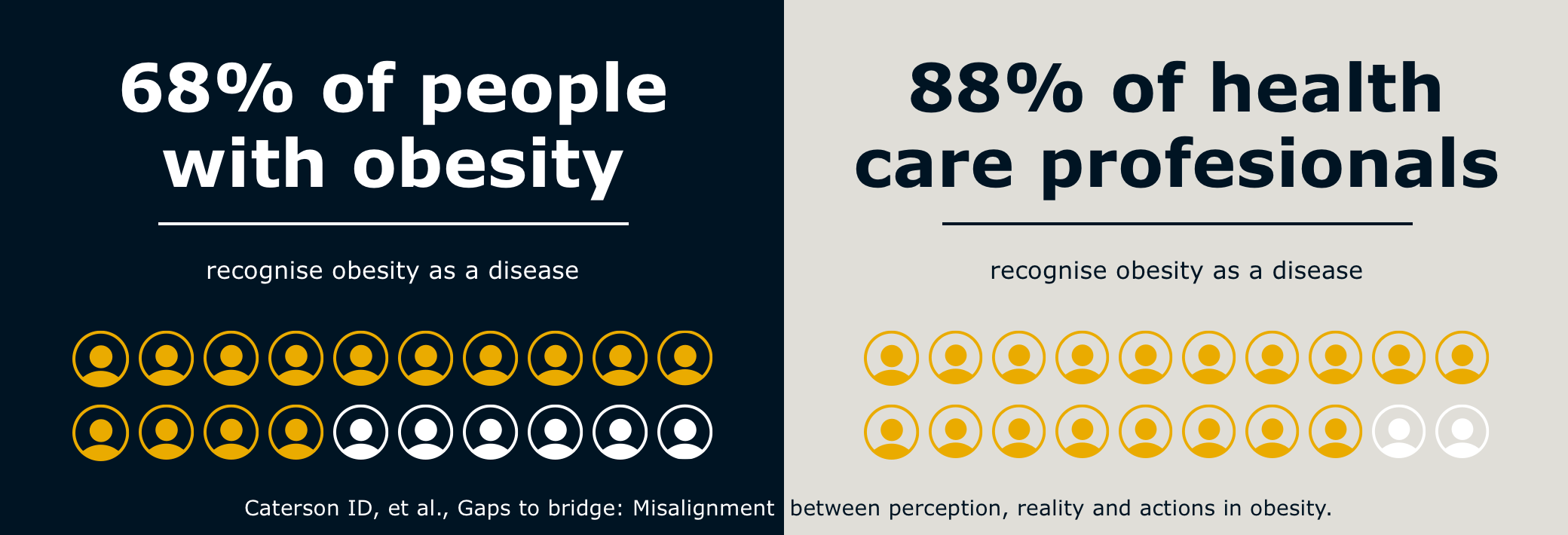
More about obesity: Definition, symptoms and diagnosis
Obesity is a disease characterized by excess body fat. Get an accurate obesity definition and find out more about obesity diagnosis and common symptoms.
We have detected that you are located in . Do you want to switch to the local site?
More and more experts are recognising that obesity is a disease, not a choice. However, this still comes as a surprise to many due to the stigma, shame and misinformation about obesity. So why is obesity considered a disease and not simply a lack of willpower?

Part of the answer to why obesity is considered a disease lies in the fact that there’s more to obesity that you can see. A lot more.
As a chronic disease, obesity shouldn’t be treated any differently. People with obesity should seek medical care and ask their doctor about treatment options. On the other side, sceptics believe a whole range of myths about obesity. They argue:
Saying obesity is a disease allows people to make excuses and not be responsible for their actions. This type of misinformation and stigma impacts the way society thinks about obesity and impairs how it should be treated.
In January 2019, the Royal College of Physicians (RCP) recognized obesity as a disease. A chronic yet manageable disease that’s affected not only by our genes but also by the modern environment we live in. According to Dr. Andrew Goddard, “It is not a lifestyle choice caused by individual greed, but a disease caused by health inequalities, genetic influences, and social factors.” Even with this recognition, the debate around why obesity is a disease continued and reactions in the UK media were strong.
Around the world, similar expert working groups have arrived at the same conclusion that often provokes heated debates in the media. Obesity is still widely misunderstood and considered a lifestyle choice – influenced by how much you eat and how little you move. In truth, most people living with obesity have many reasons for their weight. The science is clear on that obesity is not just a result of poor choices.
In fact, obesity is a disease that:
Though obesity is a disease with serious health implications, people living with obesity rarely seek professional medical help and believe they should deal with it on their own.
Thankfully, more and more healthcare providers recognise the complexity of obesity and are learning how to help. Their toolbox of treatment options is also growing and is constantly being updated. Today, obesity is a disease with treatment options that include behavioural therapy, individualized nutrition therapy, weight-loss medication, and bariatric surgery. Modern obesity management looks beyond what you eat and how much you move. It involves understanding individual eating patterns (how, when, and why you eat), as well as patterns of mood, sleep, stress, and physical activity. A personalised treatment plan will probably require a combination of different treatment options to meet your needs.
Excess weight is not the only reason why obesity is a disease. Stigma, shame and low self-esteem are the consequences we don’t see and ones that impact people living with obesity on a daily basis.
While misinformation and stigma continue to impact society’s understanding of obesity, more healthcare providers are beginning to recognize obesity as a chronic disease – one that demands medical attention and potentially treatment.
The good news is that obesity is a disease that is manageable and even minor modifications can improve your overall health and wellbeing. Weight loss of only five percent is enough to lower the risk of many weight-related health complications, including diabetes, cardiovascular disease and more.
Currently, there are several treatment options available for managing overweight and obesity. To lose weight and keep it off in a healthy way, it is important to acknowledge that obesity is a chronic disease. Speak with a weight management specialist about the right way to treat it.
HQ23OB00011
Talk to your weight management provider about treatment options that could prevent the weight you lose from coming back.

